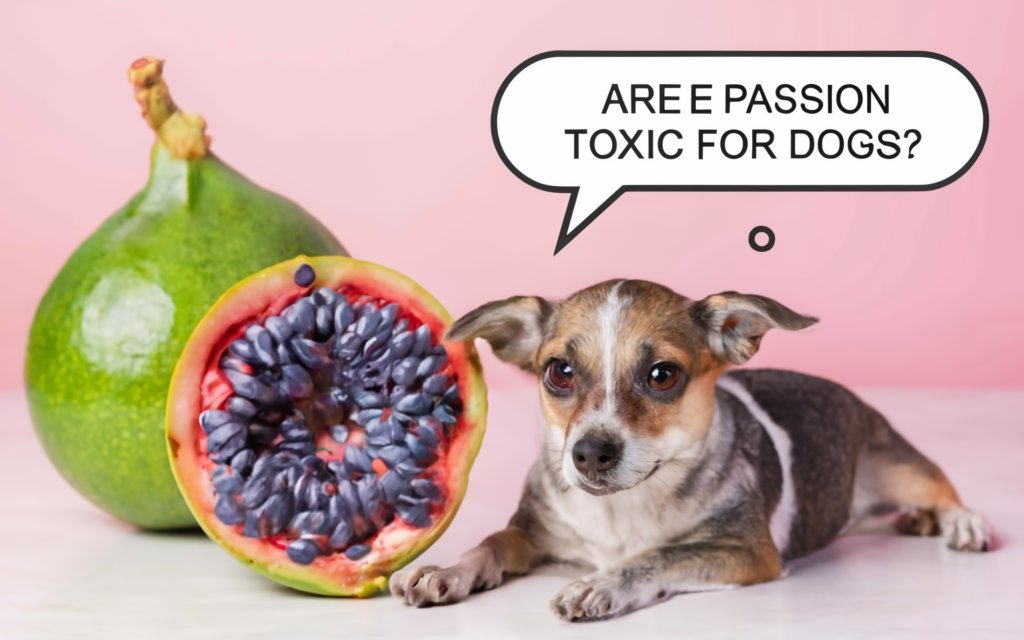Introduction
Passion fruit is a tropical fruit loved for its vibrant flavor and high nutritional value. With its sweet and tangy taste, it’s often used in drinks, desserts, and salads. While humans enjoy this exotic fruit, many pet owners wonder if it’s safe for their furry companions. Dogs have different dietary needs, and not all fruits are suitable for them. In this article, we’ll explore whether “Can dogs Eat passion fruit?” the potential risks it may pose, and what to do if your dog accidentally eats it. Understanding which foods are beneficial or harmful for your dog is key to keeping them healthy and happy.
Can dogs Eat passion fruit?
No, dogs should not eat passion fruit. The seeds and rind are toxic and can cause serious health issues.
- Introduction
- What Is Passion Fruit?
- Can Dogs Eat Passion Fruit?
- Are Passion Fruit Safe for Dogs?
- Are Passion Fruit Bad for Dogs?
- Are Passion Fruit Toxic for Dogs?
- Table of Nutrition (Per 100g of Passion Fruit)
- Can Dogs Eat Passion Fruit Juice?
- Can Dogs Eat Passion Fruit Seeds?
- Can Dogs Eat Passion Fruit Yogurt?
- Benefits of Passion Fruit to Dogs
- Risks of Passion Fruit to Dogs
- Safe Alternatives to Passion Fruit for Dogs
- What Should I Do If My Dog Ate Passion Fruit?
- How to Feed Passion Fruit Safely
What Is Passion Fruit?
Passion fruit is a tropical fruit that comes from the vine species Passiflora edulis, native to South America but now grown in warm climates worldwide. It has a distinctive round or oval shape with a tough outer rind and a juicy, seed-filled interior. The fruit’s flavor is a mix of sweet and tart, making it a favorite in drinks, desserts, and jams. Passion fruit is highly valued for its high vitamin content, particularly vitamins A and C, and its abundance of antioxidants and dietary fiber. While it’s a refreshing and nutritious choice for humans, it may not be suitable for dogs.

Passion Fruit Ingredients
The key components of passion fruit include:
- Water: A significant portion of passion fruit is water, which contributes to its hydrating properties.
- Carbohydrates: Mostly in the form of natural sugars, giving the fruit its characteristic sweetness.
- Fiber: Beneficial for digestion in humans, but may cause issues for dogs in large amounts.
- Vitamins: High in vitamin C (which supports immune health) and vitamin A (important for skin and eye health).
- Minerals: Contains essential minerals like potassium, which supports heart health, and magnesium, which helps with muscle and nerve function.
- Seeds: The seeds, however, pose a health risk to dogs due to toxic compounds.
Can Dogs Eat Passion Fruit?
No, dogs should not eat passion fruit. While the flesh of the fruit may not be directly toxic, the seeds and rind contain cyanogenic glycosides, which can release cyanide when metabolized. This poses a serious risk of poisoning, especially if consumed in large amounts. Even small quantities of passion fruit may lead to digestive upset or other health issues in dogs.
Are Passion Fruit Safe for Dogs?
The flesh of passion fruit may be non-toxic, but because it’s difficult to separate the edible parts from the seeds and rind, it’s not considered safe for dogs. Consuming the seeds or rind can lead to poisoning, and even the pulp may irritate your dog’s digestive system. For safety, it’s best to avoid feeding passion fruit to your dog altogether.
Are Passion Fruit Bad for Dogs?
Yes, passion fruit is bad for dogs due to the risks posed by its seeds and rind. Even if the pulp is not inherently harmful, the chance of your dog accidentally ingesting toxic parts makes it a risky choice. Additionally, the high sugar content can lead to obesity or dental problems in dogs if consumed regularly.
Are Passion Fruit Toxic for Dogs?
Yes, the seeds and rind of passion fruit are toxic to dogs. They contain cyanogenic glycosides, which can release cyanide when broken down by the dog’s digestive system. Cyanide poisoning can be fatal if large amounts are consumed. Symptoms of cyanide poisoning in dogs include:
- Difficulty breathing
- Weakness or lethargy
- Tremors or seizures
- Drooling or vomiting
- Collapse or even death in severe cases

Table of Nutrition (Per 100g of Passion Fruit)
| Nutrient | Value |
| Calories | 97 kcal |
| Carbohydrates | 23 g |
| Sugars | 11 g |
| Protein | 2.2 g |
| Fat | 0.4 g |
| Fiber | 10.4 g |
| Vitamin A | 25% of the RDA |
| Vitamin C | 30 mg |
| Potassium | 348 mg |
| Iron | 1.6 mg |
Can Dogs Eat Passion Fruit Juice?
No, dogs should not consume passion fruit juice. Even if seeds and rind are removed, the juice still contains a high concentration of sugar, which is unhealthy for dogs. In addition, the juice might contain remnants of the seeds, posing a toxicity risk.
Can Dogs Eat Passion Fruit Seeds?
No, passion fruit seeds are toxic for dogs. The seeds contain cyanogenic compounds that can release cyanide. Ingesting the seeds can cause cyanide poisoning, which is life-threatening. It’s important to keep passion fruit seeds far from your dog’s reach.

Can Dogs Eat Passion Fruit Yogurt?
While plain yogurt may be fine for dogs, passion fruit yogurt is not recommended. Flavored yogurts often contain added sugars, artificial flavors, or pieces of fruit that may be harmful to your dog. The passion fruit seeds, often included in yogurt, are toxic, so avoid giving your dog any yogurt with passion fruit.
Benefits of Passion Fruit to Dogs
There are no significant benefits of passion fruit to dogs, especially when considering the associated risks. While the fruit is high in fiber and vitamins that are good for humans, these nutrients are available in many other fruits that are much safer for dogs.
Risks of Passion Fruit to Dogs
- Cyanide Poisoning: The seeds and rind can cause cyanide poisoning, a potentially fatal condition.
- Digestive Issues: Even the pulp can irritate a dog’s digestive system, leading to vomiting or diarrhea.
- Choking Hazard: The seeds present a choking risk, especially for small dogs.
- High Sugar Content: Excessive sugar can lead to obesity, diabetes, or dental issues in dogs.
Safe Alternatives to Passion Fruit for Dogs
If you’re looking for a healthy treat for your dog, there are plenty of safe fruits and foods to choose from, including:
- Apples (without seeds)
- Bananas
- Blueberries
- Carrots
- Pumpkin
- Watermelon (without seeds)
These options provide essential nutrients without the risk of toxicity.

What Should I Do If My Dog Ate Passion Fruit?
If your dog accidentally consumes passion fruit, especially the seeds or rind, observe them closely for any signs of cyanide poisoning. Symptoms can include vomiting, difficulty breathing, lethargy, and seizures. Contact your veterinarian immediately if you notice any of these symptoms, as cyanide poisoning requires urgent medical attention.
How to Feed Passion Fruit Safely
It’s best to avoid feeding passion fruit to dogs entirely due to the associated risks. However, if you choose to offer a small amount of the pulp (with all seeds and rind removed), monitor your dog closely for any signs of digestive upset.
Pros
Cons
While passion fruit offers several health benefits for humans, it’s not a safe option for dogs. The seeds and rind contain toxic compounds that can cause cyanide poisoning, and even the flesh can lead to digestive issues. It’s safer to stick with dog-friendly fruits like apples, bananas, or blueberries. If your dog accidentally eats passion fruit, contact a veterinarian for advice.





